Cycling in Yorkshire & Beyond

Cycling in Yorkshire & Beyond

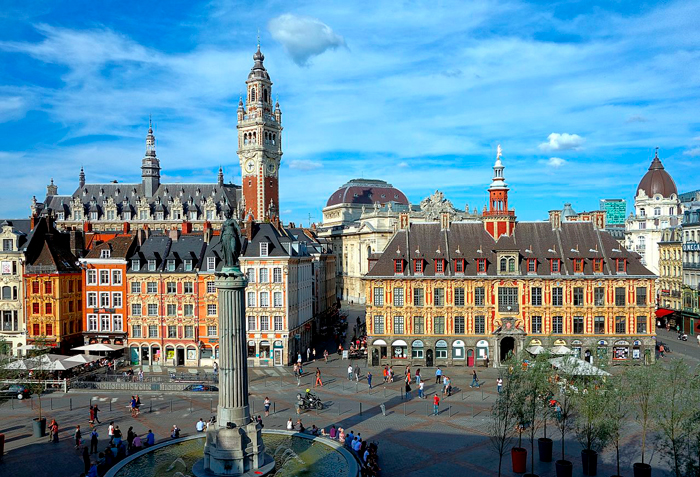
Stage 1 of the Tour de France 2025 is a 184.9km flat stage starting and finishing in Lille.
The parcours is a clockwise loop. The riders head south to Lens, then north to Béthune and Hazebrouck.
There's a climb of the Côte de Cassel, then another of the Mont Noir, before the return to Lille via Armentières.
Stage 1 is likely to end in a bunch sprint.
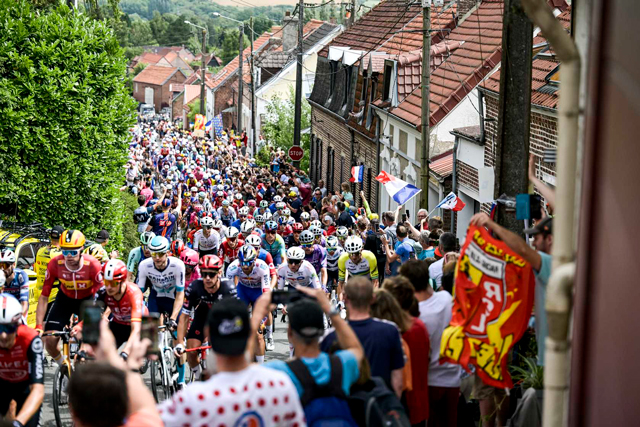
This is the race report for Stage 1 Tour de France 2025.
These are video highlights of Stage 1.
Race Details | Poll | Map & Profile | Timings | Videos | Food & Drink | Route Notes | Favourites
| Date | Saturday 5th July 2025 |
|---|---|
| Stage classification | Flat |
| Distance | 184.9km |
| Intermediate sprint | La Motte-au-Bois (Morbecque) |
| Climbs | Côte de Notre-Dame-de Lorette (Cat. 4) Côte de Cassel (Cat. 4) Mont Noir (Cat. 4) |
| Total climbing | 1,150m |
Vote for one of the main contenders to win Stage 1.
This is a map of the route of Stage 1, Tour de France 2025.

This is a zoom-able map of Stage 1 Tour de France 2025.
This is the profile of Stage 1 Tour de France 2025.

| Caravan | Fast Schedule | Slow Schedule | |
|---|---|---|---|
| Start Time (départ fictif) | 1125 |
1325 |
1325 |
| Start Time (départ réel) | 1140 |
1340 |
1340 |
| Intermediate Sprint | 1342 |
1532 |
1542 |
| Côte de Cassel Climb | 1408 |
1555 |
1608 |
| Finish Line (184.9km) | 1558 |
1736 |
1758 |
This is a video of the route of Stage 1 Tour de France 2025.
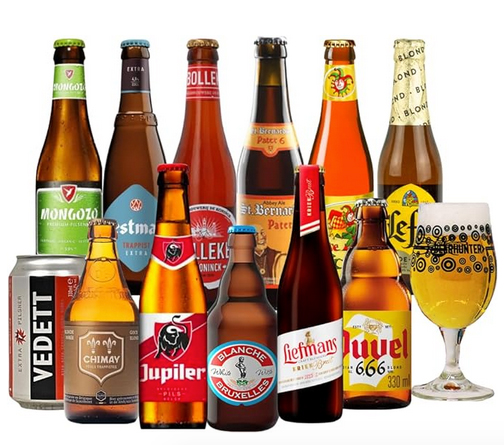
The food and drink of Lille and the surrounding area is influenced by its proximity to the border with Belgium, and more specifically Flanders.
Le Welsh - a local version of
Welsh rarebit - is basically cheese on toast, but with a twist.
Cheese is melted and mixed with beer and poured over toast and ham.
It can be topped with a fried egg and served with Belgian fries.
Moules-frites is another Belgian speciality that has made its way over the border.
Potjevleesch is meat which has been marinated, and is then served in a vinegar gelatin. La carbonade flamande is a Flemish beef stew.
La Cramique is a brioche bread with raisins in it.
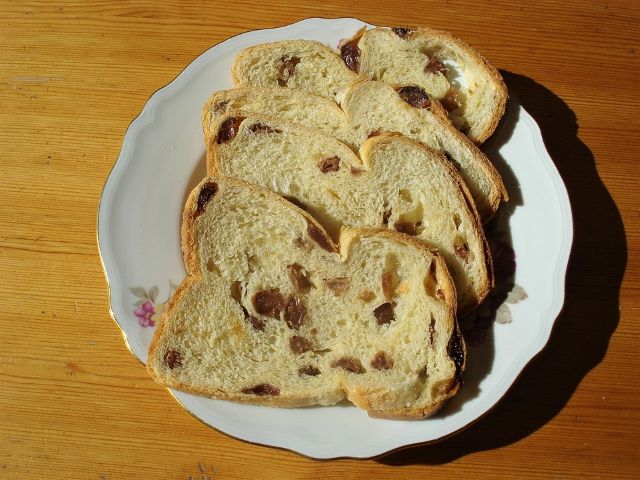
Lille is associated with beer more than wine. The brewing tradition is similar to that of nearby Belgium, so you could sample Belgian beers with Stage 1.
Buy a mixed case of Belgian craft beer (affiliate link).
The stage starts in Lille (départ fictif).
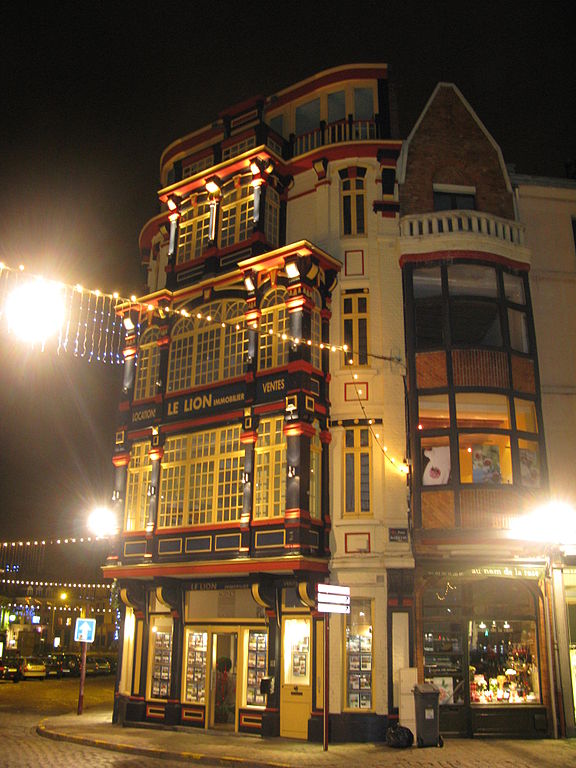
Lille is a city on the Deûle river, in French Flanders. It's the capital of the Hauts-de-France region, and it has 236,000 inhabitants. The Metropolitan area has a population of 1.5 million.
In France Lille is known as the Capital of Flanders.
Lille may have been founded in the year 640.
There were Viking invasions in the 800 and 900s. The first time Lille is mentioned in a document is in 1066, when it was controlled by the County of Flanders.
In the 1100s, Lille became famous for its cloth fair.
From 1369, the County of Flanders became part of Burgundy, ruled by the Duke of Burgundy. After the death of the last Duke of Burgundy in 1477, the County of Flanders passed by marriage to Austria, then to the Spanish Habsburgs in the 1500s.
In 1667, Louis XIV of France laid siege to Lille, and took it for France. Vauban built the Citadel.
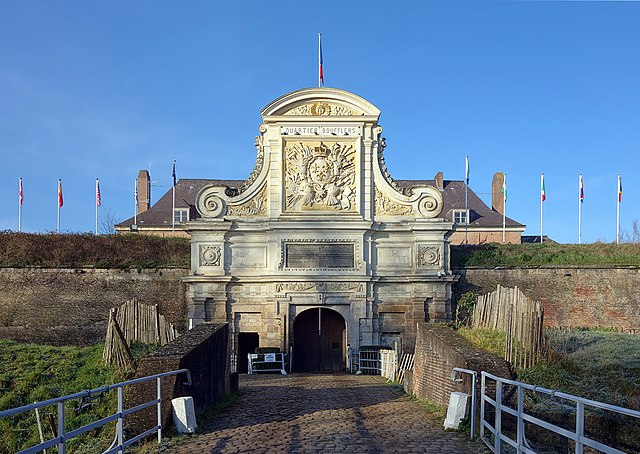
The Dutch occupied Lille from 1708 to 1713 during the War of Spanish Succession.
In the 1800s, Lille's cotton-based textile industry flourished. Later, coal mines added to the city's prosperity.
Lille was under German occupation in World War I, and again during World War II.
Post-war, the textile and coal-mining industries declined, and from the 1980s Lille focused on services.
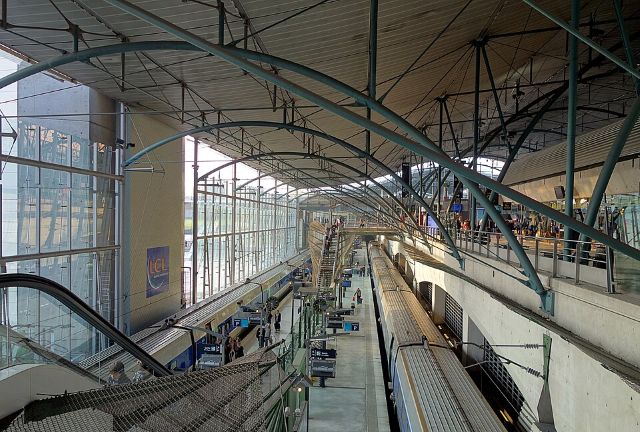
In 1993, a TGV link from Paris to Lille was completed. In 1994, the Euralille shopping centre opened.
Lille holds a braderie on the first weekend in September - a street fair and market.
Lille's public transport includes a driverless light metro.
110,000 young people study at the University in Lille, where Louis Pasteur was the first Dean of the Faculty of Sciences.
Lille is twinned with the English city of Leeds.
Paris-Lille was often the first stage of the Tour de France in the early decades of the 1900s.
Bernard Hinault won a stage here in 1980. There was a Grand Départ in Lille in 1994, when Chris Boardman won the prologue.
Marcel Kittel won Stage 4 of the 2014 Tour de France in Lille, after a Grand Départ in Yorkshire that year.
The peloton heads south out of Lille towards Lens. The départ réel is on the M147 Rue Victor Hugo on the edge of Wattignies.
The race continues through Seclin, Carvin and Harnes to Lens.

Lens is a town of 242,00 people in the Pas-de-Calais département.
It started off as a fortification against the Norman invasions.
Lens expanded from the mid-1800s after coal was discovered and exploited by the Lens Mining Company.
Lens was occupied and largely destroyed during World War I, and suffered again in World War II this time from Allied bombing.
The last coal mine closed in 1986. Lens now has a campus of the University of Artois.
Lens has a football team, and its stadium has been used for international matches, including at the 1998 World Cup and the 2016 Euros.
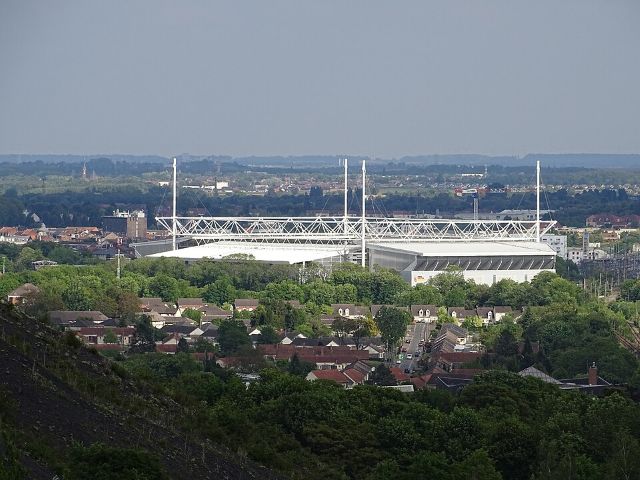
A branch of the Louvre museum, the Musée du Louvre-Lens, opened in Lens. Stage 1 goes past it.
The route continues through Liévin to Souchez, and from here it tackles the Côte de Notre-Dame de Lorette.
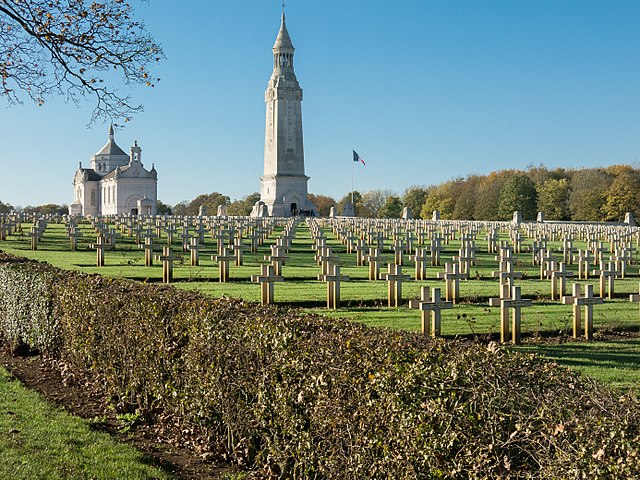
The first categorised climb is of the Côte de Notre-Dame-de-Lorette near Ablain-Saint-Nazaire.
This is the world's largest French military cemetery. The ridge here was high ground that was strategically important during World War I, and four battles took place between the French and German armies in 1914 and 1915.
It's a climb on the D58e3 to the Mont Hernu. The road passes the Nécropole Nationale de Notre-Dame-de-Lorette.
It's a climb of 1km at an average 7.6% gradient to a height of 165m.
1 point in the King of the Mountains competition is available for 1st place.
After the climb, the race route is north west then north on the D937, through Aix-Noulette and Sains-en-Gohelle to Noeux-les-Mines.
There's an artificial ski slope on an old coal-mining slag heap at Noeux-les-Mines.
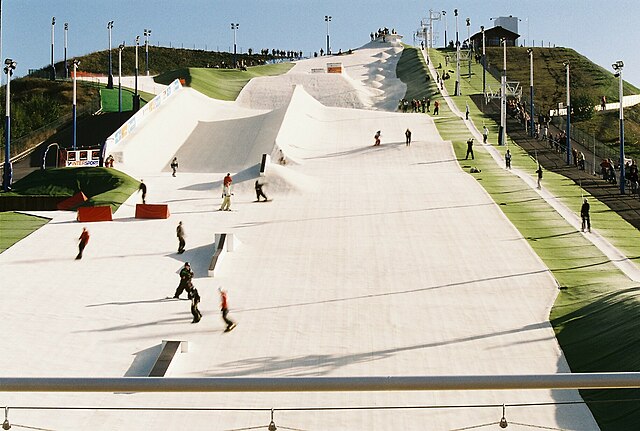
The route continues to Béthune.
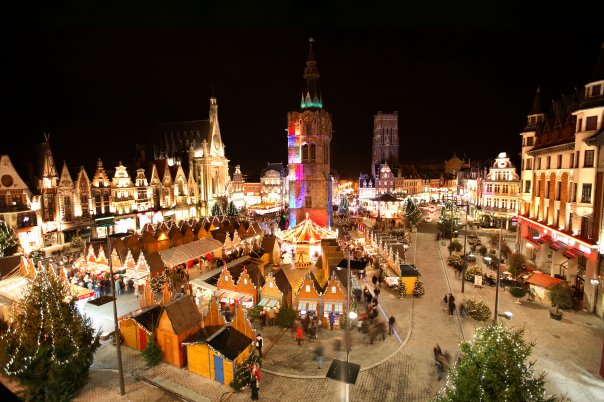
Béthune is a town of around 25,000 people. It has a central Grand Place and belfry.
It was an important railway junction and command centre for British Canadian and Indian forces in World War I. It was badly damaged during an offensive by German troops in 1918.
The town was damaged again in 1940 when attacked and captured by SS Panzer Division Totenkopf.
Béthune's belfry has 36 bells and plays melodies every 15 minutes. They include a lullaby in the local ch'ti dialect.
To learn more about ch'ti, watch the film Bienvenue Chez les Ch'tis.

How to Write a Kindle Ebook is a step by step guide to writing and publishing an ebook on Amazon.
It takes you through the process of writing and formatting it using Microsoft Word, then uploading it to Kindle Direct Publishing and selling it on Amazon.
There's advice and guidance at every stage, with examples including screenshots, and tips on how to overcome practical problems you're likely to encounter.
How to Write a Kindle Ebook will be your reliable and trusted companion as you write and publish your own book.
'I find this a really helpful and informative guide to e-book writing and recommend to others' - reviewer on Amazon.
Buy the ebook or the paperback on Amazon.
The riders continue north past the Aérodrome de Merville-Calonne, into the Nord département and across La Lys.
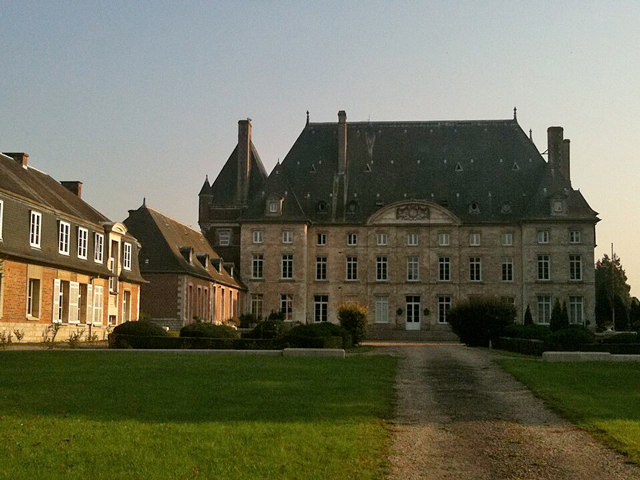
They then head through woods to a hamlet called La Motte-du-Bois. The château there belonged to the Counts of Flanders then the Dukes of Burgundy then the Counts of Morbecque. Now it houses the Aeronautical Institute of Amaury de la Grange.
This is where the intermediate sprint takes place.
Green jersey points are 20 points for 1st place down to 1 point for 15th place.
A railway line between Hazebrouck and Merville, now disused, ran through La Motte-du-Bois. Let's see which of the sprinters does the best impression of an express train at the intermediate sprint.
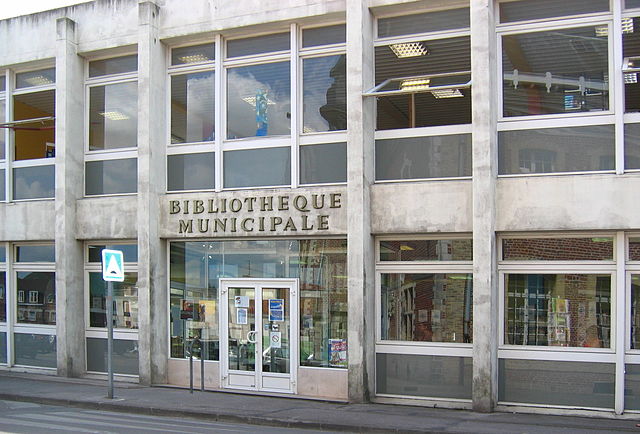
Hazebrouck was only incorporated into France in 1678, and school lessons were conducted in West Flemish until 1880.
In World War I, Hazebrouck was an important railway and supply centre. German forces attacked along the Lys in 1918 and captured Merville, but were stopped before reaching Hazebrouck.
Next Stage 1 heads north to the village of Cassel.
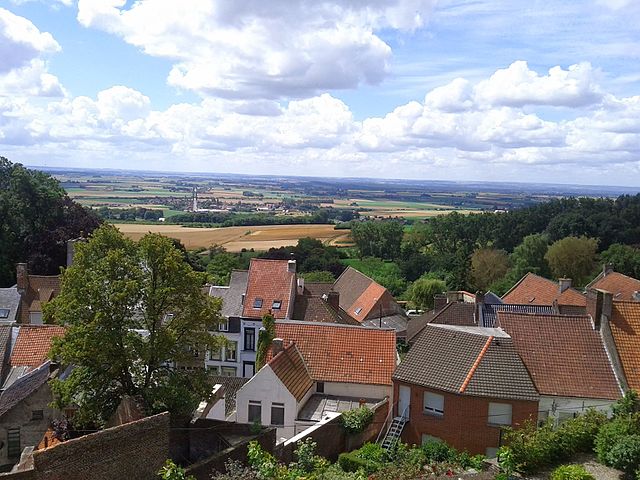
The next climb is the Côte de Cassel, which includes cobbles.
The ascent is 1.9km at an average gradient of 3.5% to a height of 144m.
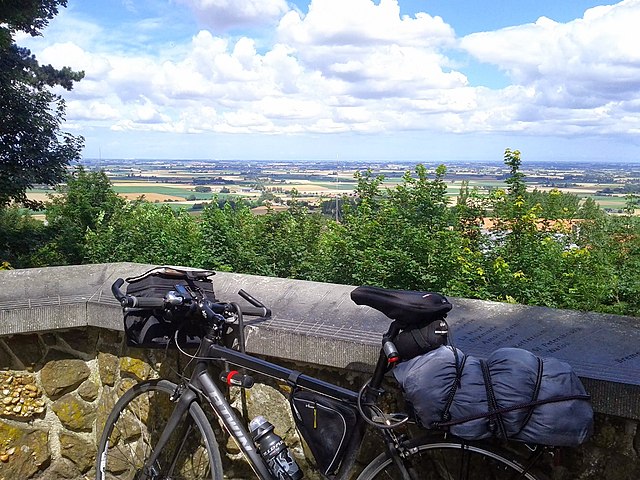
1 point in the King of the Mountains competition is available for 1st place.
Stage 1 continues via a loop on Route de Watten, Route du Saint-Hubert, Route de Wemaers-Cappel and Route de Dunkerque back to the base of the Cassel climb.
Next the riders head east to Steenvoorde.
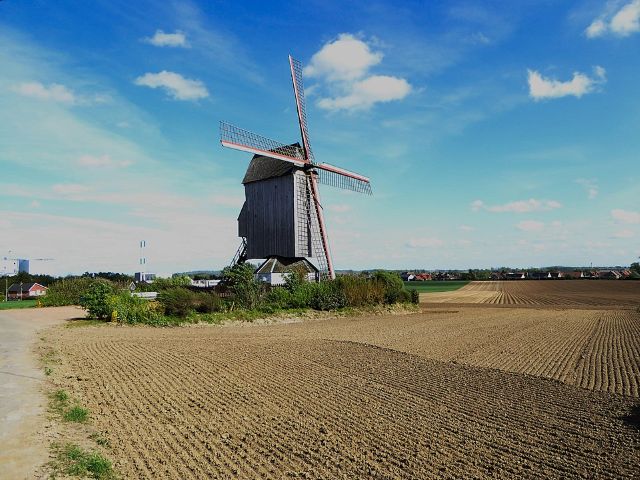
Then they go south east to Godewaersvelde and Méteren. From Méteren, the route is NNE towards Saint-Jans-Cappel and Mont Noir.
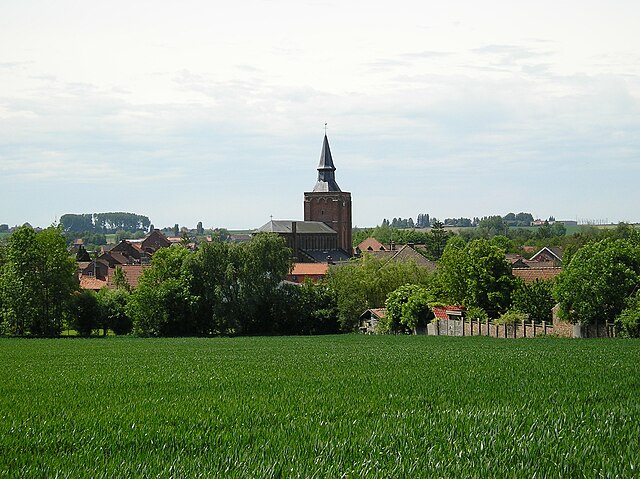
The final categorised climb is Mont Noir; Mont Noir is not quite as impressive as Mont Blanc.
The climb is 1.3km at an average 6.4% to a height of 143m.
1 point in the King of the Mountains competition is available for 1st place.
Now the route heads south to Bailleul.
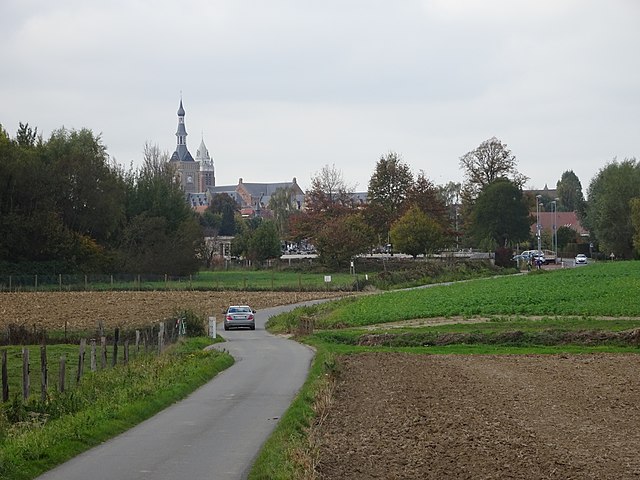
Stage 1 continues south east on the D933 Route de Lille to Armentières.
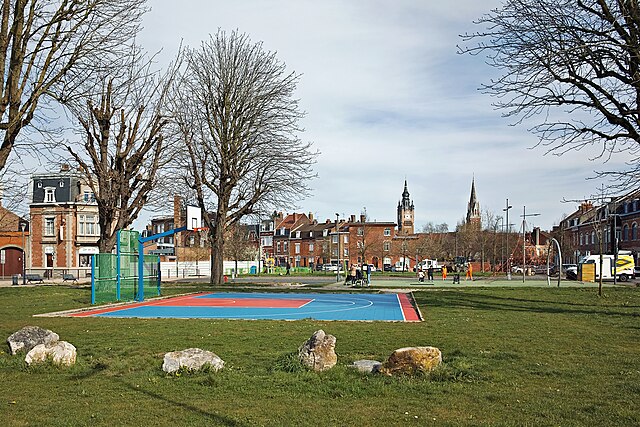
Armentières has the motto pauvre mais fière - poor but proud.
At the end of the 1900s due to its weaving and spinning industries, it was called the City of Fabric. There was also brewing.
It was the site of the Battle of Armentières in 1914, then in 1917 and 1918 it was repeatedly shelled by the Germans with mustard gas.
British and American troops sang a song called Mademoiselle from Armentières in World War I, including the lines:
Mademoiselle from Armentières parlez-vous!
Mademoiselle from Armentières parlez-vous!
Mademoiselle from Armentières,
She hasn't been kissed for 40 years,
Inky pinky parlez vous!
You might forget the gas and shell parlez-vous!
You might forget the gas and shell parlez-vous!
You might forget the gas and shell,
You'll never forget the Mademoiselle,
Inky pinky parlez-vous
From Armentières the race goes north east to Frelinghen, then south east on the Rue de Messines to Verlinghem.
It turns south west towards Pérenchies.
Next, it goes south east through the Lille suburb of Lomme, picking up the M933 Avenue de Dunkerque.
The race will cross the Canal de la Deule then turn right on the Boulevard de la Lorraine alongside the Port de Lille, left on the Rue de Turenne, and left on Boulevard Vauban towards the Citadelle de Lille.
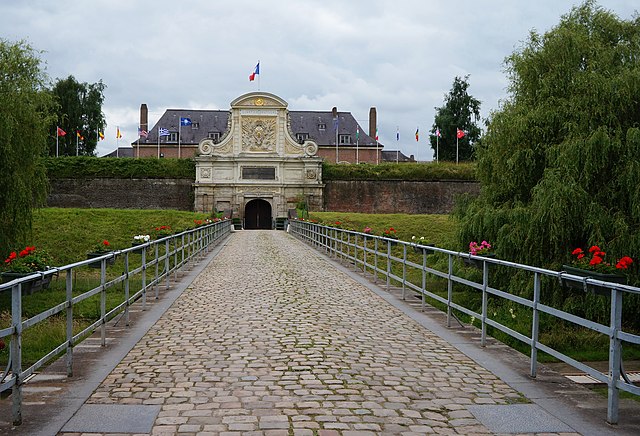
Stage 1 ends with a sprint finish on the Boulevard Vauban in Lille. The finish line is on Boulevard Vauban near the junction with Rue de Solférino.
There are green jersey points available, from 50 points for 1st place to 2 points for 15th place.
There are also time bonuses of:
Marcel Kittel won a sprint in Lille on Stage 4 of the Tour de France 2014.

Stage 1 is likely to be contested by sprinters, possibly including Jasper Philipsen, Tim Merlier, Dylan Groenewegen and Wout van Aert
Who do you think will win Stage 1 of the 2025 Tour de France in Lille?

Amazon Fire TV Stick Lite, £34.99 at the time of writing (affiliate link).
As an Amazon Associate, I earn from qualifying purchases.

Bike Rides in the Yorkshire Dales is available in colour paperback.
Find out more about Bike Rides in the Yorkshire Dales or buy a copy.

Bike Rides In and Around York features a historical city tour, plus family rides, road rides, and mountain bike rides.
Find out more about Bike Rides In and Around York or buy a copy.

Bike Rides in Harrogate and Nidderdale is a book of family, mountain and road bike rides.
Find out more about Bike Rides in Harrogate and Nidderdale or buy a copy.

Garmin Edge Explore, £197.99 at the time of writing.
Garmin Edge Explore on Amazon (affiliate link).

Faster by Michael Hutchinson on Amazon (affiliate link).